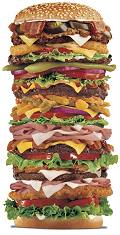Is Sugar Bad for You? - Page 1
When we first started to add sweet tastes to our foods they were from fully natural sources and had not really been tampered with. However, these days the white crystalline substance we know of as sugar is an unnatural and heavily refined substance. It is almost unrecognisable from its natural state and it is produced by large-scale industrial processes (mostly from sugar cane or sugar beets).
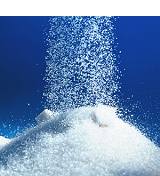
| Contents of this article: | |
| Page 1: |
The Sugar versus Drugs controversy Is Sugar more harmful than Drugs? The History of Sugar |
| Page 2: |
The reason Sugar is such a Problem Sugar is Hidden in your Food The Damage too much Sugar can cause |
It is made by refining it down to pure sucrose (sugar). Interestingly, the raw material that is extracted from the plant does have some vitamins, minerals, proteins, enzymes and other beneficial nutrients. However, during the man-made processing, these are all stripped away to just leave the basic concentrated substance called sucrose.
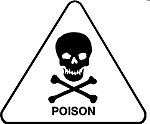 The human body can't easily handle this unnatural substance. This is especially so in the rather large quantities that is now commonly eaten in today's society.
The human body can't easily handle this unnatural substance. This is especially so in the rather large quantities that is now commonly eaten in today's society.
Sugar is addictive. Did you know that the average American now consumes approximately 115 lbs. of sugar per year. This is every man, woman and child on average. It is a staggering statistic. A few hundred years ago this product didn't exist and the human body did not come across sucrose in large quantities. One of the closest things humans encountered that was sweet, was nectar or honey.
The Sugar versus Drugs Controversy
Drugs and other narcotics bring absolute devastation to the lives they touch. This can be in the form of crime, violence, pain and the individual trauma and destruction that drugs will always cause to a person's body.
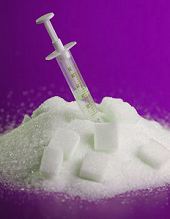 Even though the drug problem is widespread and growing, in most communities it still badly affects only a relatively small proportion of people in most societies. The effects for the people concerned though are usually catastrophic.
Even though the drug problem is widespread and growing, in most communities it still badly affects only a relatively small proportion of people in most societies. The effects for the people concerned though are usually catastrophic.
Due to the widespread use of excessive sugar in our diets, it has controversially been stated that excessive sugar use has just as much negative impact on people's lives, perhaps even more so, than harmful drugs.
Whilst we think this may have made headline news to create more publicity about the harmful effects of too much sugar, it may have some basis in truth if you look at the big picture.
Whilst the evidence of excessive sugar consumption is there for all to see, this is not as acute or life-destroying as the harm drugs can do. There is no need to sensationalise any facts about sugar - it is harmful when taken to excess. Unfortunately, sugar is very addictive and it helps foods taste nice. An interesting aspect of sugar is that even whilst it is causing harm to the body, your taste buds can actually become de-sensitized to the sweetness levels. In other words, you can need to add more and more sugar to start to believe something is sweet.
A quite surprising discovery over the last few decades is that most people underestimate how much sugar they consume in their drinks and foods. Many people can hardly survive without having to grab a Starbucks or similar coffee. Many mistakenly think they are seeking a caffeine fix. In fact, it can be the high amounts of sugar in these and similar drinks which people find addictive. The same goes for many soft drinks, cokes and colas etc.
Thankfully it is not too difficult to reduce the amounts of sugars we consume. Even though they are addictive, sugar is a lot easy to "come-off" than most hard drugs.
The large food companies should change
By the way, we shouldn't let the large food and drinks manufacturer's off the hook. They have been responsible for more harm to the health of society than even alcohol and cigarette manufacturers. They know that people like sugar and that it is rather addictive. They also know that sugar can be added to cheap, nutritionally poor ingredients and produce food that tastes better. The fact that this sweetened junk food plays havoc with our blood sugar levels, causes spikes and troughs in energy levels and still makes people crave more, is morally disgusting.
Whole generations of people have been affected and these companies should shoulder some of the blame. Some may say "It is a person's own fault" if they eat too much sugar and become obese. However, high sugar levels in many foods have been kept quiet and misleading marketing has made the problem even worse. For example, why in heaven's sake is it necessary to put over 10 teaspoons of sugar in a tin of baked beans? Why does a can of coke need a dozen or more teaspoons of sugar in it? It is all designed to make junk taste better and to be more addictive. More cravings equals more buying which equals more profit $$$$. (The damage to people's health is conveniently overlooked!)
What can I do about it?.....Just stop buying their junk. Mention it to friends. Get them to mention it to their friends. Only when consumers start to demand less sugar, and less fat for that matter, in their foods, will companies listen. We are in periods of dramatic change on this planet right now. Even large companies go bust every month. So make the greedy corporations listen by not giving them your financial support. If enough people do this then some of the more ethical companies will change and everyone will win.
We all like a little treat from time to time. It is a real pleasure and fun, but we don't need junk and hidden sugar at every meal time. Educate your family and before too long, healthy eating (with occasional treats) becomes a good habit.
Is Sugar More Harmful to Society than Drugs?
Here is why reports suggest that sugar does more damage than any other poison, drug or narcotic:
(1) It is considered a "food" and ingested in such massive quantities, and
(2) The damaging effects begin early, from the day a baby is born and is fed sugar in its formula. Even mothers milk is contaminated with it if the mother eats sugar, and
(3) Practically 95% of people are addicted to it to some degree or other.

Too Much Sugar is Eaten Today
Question: At what point does a substance that can be good for us, actually become harmful?
Answer: In simple terms - it depends on how much Quantity is consumed.
To try to explain this, here is an exaggerated illustration of what this means:
Most of us realise that the venom of a rattlesnake, a cobra, and other venomous insects can be deadly to the human body.
In fact, there are some snakes and spiders whose bites are so deadly they can cause death within a matter of seconds.
Nevertheless, even snake and spider venom, deadly as they are, can be used for therapeutic, medical purposes when used in very tiny quantities.
The same has occurred with many chemicals over the years including arsenic and mercury etc. This is because:
In small quantities, some chemicals act as a stimulant.
A slightly larger amount becomes a sedative.
But a larger quantity becomes a poison and can kill you.
So think about where sugar may fall on the above scale of good versus bad...
The History of Sugar
Sugar had been around in small quantities for several thousand years. However, it was practically unknown in ancient times and only formed an insignificant part of the average diet in the Classical civilizations of Egypt, Greece and Rome.
The Greeks (who had a word for nearly everything) did not even have a word for sugar. Even in medieval Europe, it was practically unknown and then it was only a rare delicacy in the royal courts.
During the last major Crusade that ended in 1204, some of the Christian Crusaders were introduced to sugar used by the Saracens.
The Moors when invading and colonizing the southern part of Spain grew sugar cane on Spanish soil and refined sugar.
When Spain drove out the Moors, it inherited some of the sugarcane plantations. It was during this time that Christendom took its first big bite of the forbidden fruit and liked it.
Then sugar plantations were created and its history became deeply and shamefully entwined with the slave trade...
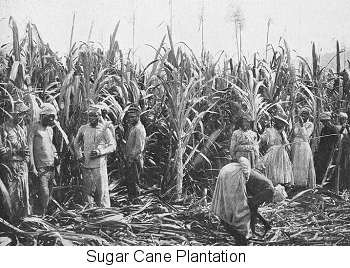
Refined Sugar is an unnatural chemical like heroin
Why is it that sugar can be so devastating to our health?
One reason is that it is pure chemical and by extreme refining, it has been stripped of all the natural nutrients nutrition that it originally had.
In their natural state, most plants, vegetables and fruits have a wide range of nutritional ingredients. These can consist of enzymes, vitamins, minerals, calories, and countless other chemical compounds. The process of heavily refining natural foods, usually strips away the majority of the attached chemical compounds and nutrients. This is done to make a product seem more palatable or appetizing to humans. But it comes at a cost....Interestingly, heroin and sugar are arrived at by very similar processes of refinement.
In producing heroin, the opium is first extracted from the poppy. The opium is then refined into morphine.
The "mad" chemists then went to work on morphine and further refined it into heroin. At the time they proclaimed they had "discovered" a wonderful new pain-killer that was non-addictive. If only they knew...
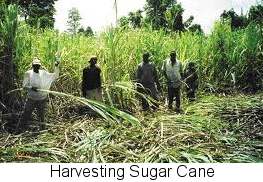
Similarly, sugar is first pressed as a juice from the cane (or beet) and refined into molasses. Then it is refined into brown sugar, and finally into white crystals (with the chemical formula ![]() ). At this point, it is a rather harsh chemical which the body can find difficult to easily process and digest. If too much is eaten it can cause wild havoc to the energy systems and digestive processes of the body. Just a few teaspoons of sugar can cause insulin levels to change quite dramatically in the blood. This affects how the rest of our food gets digested and over time it can take its toll on our bodies. It even makes it easier for the body to hold onto its fat reserves. There is some complicated science on this subject, but one primal reason why obesity can develop from excessive sugar intake is that at a cellular level, the body senses its energy levels going up and down like a yo-yo. To try to stabilise this the body begins to store more of the fat it consumes as a kind of safety net. The sugar throws things into chaos and the body "plays it safe" and tries to store an alternative form of energy in the shape of fat.
). At this point, it is a rather harsh chemical which the body can find difficult to easily process and digest. If too much is eaten it can cause wild havoc to the energy systems and digestive processes of the body. Just a few teaspoons of sugar can cause insulin levels to change quite dramatically in the blood. This affects how the rest of our food gets digested and over time it can take its toll on our bodies. It even makes it easier for the body to hold onto its fat reserves. There is some complicated science on this subject, but one primal reason why obesity can develop from excessive sugar intake is that at a cellular level, the body senses its energy levels going up and down like a yo-yo. To try to stabilise this the body begins to store more of the fat it consumes as a kind of safety net. The sugar throws things into chaos and the body "plays it safe" and tries to store an alternative form of energy in the shape of fat.



